February will mark a year since the start of the war in Ukraine. There are not only large-scale military actions between Russia and Ukraine - there is a serious information war going on.
Report brings to the attention of the readers an interview with Director-General of the Ukrainian news agency UNIAN Mikhail Gannitsky, who, among other things, spoke about the work of the Ukrainian media in this difficult period for Ukraine, about the fight against disinformation and fakes, about cooperation with the media of other countries, including Azerbaijan.
- How do you assess the work of the media, in particular, UNIAN, at a time when Ukraine is engulfed in war? What can and should be done better? Do you have editorial staff who joined the army and went to the front line?
- A lot of work is being done now. We, journalists, usually complain about the lack of news, that we have nothing to write about. Since February 24, we have no such days. Unfortunately, including the days when there is no bad news.
The work schedule has become very difficult, all employees, even those who do not cover military events at the front or in hot spots, first switched to a 7-day work format. Later, we were able to establish a more convenient format, switched to a six-day working regime. Shifts were organized so that reinforced teams of editors and journalists would work on the necessary days and hours.
It became harder to work also because we decided to work remotely. Our office is located in the central part of Kyiv, and the features of the building are such that in the event of a missile strike or other Russian attacks in this area, the risk of injury is very high - we have glass walls. We sent employees to work from home, even those who decided to stay in Kyiv, and this is a large part of our employees.
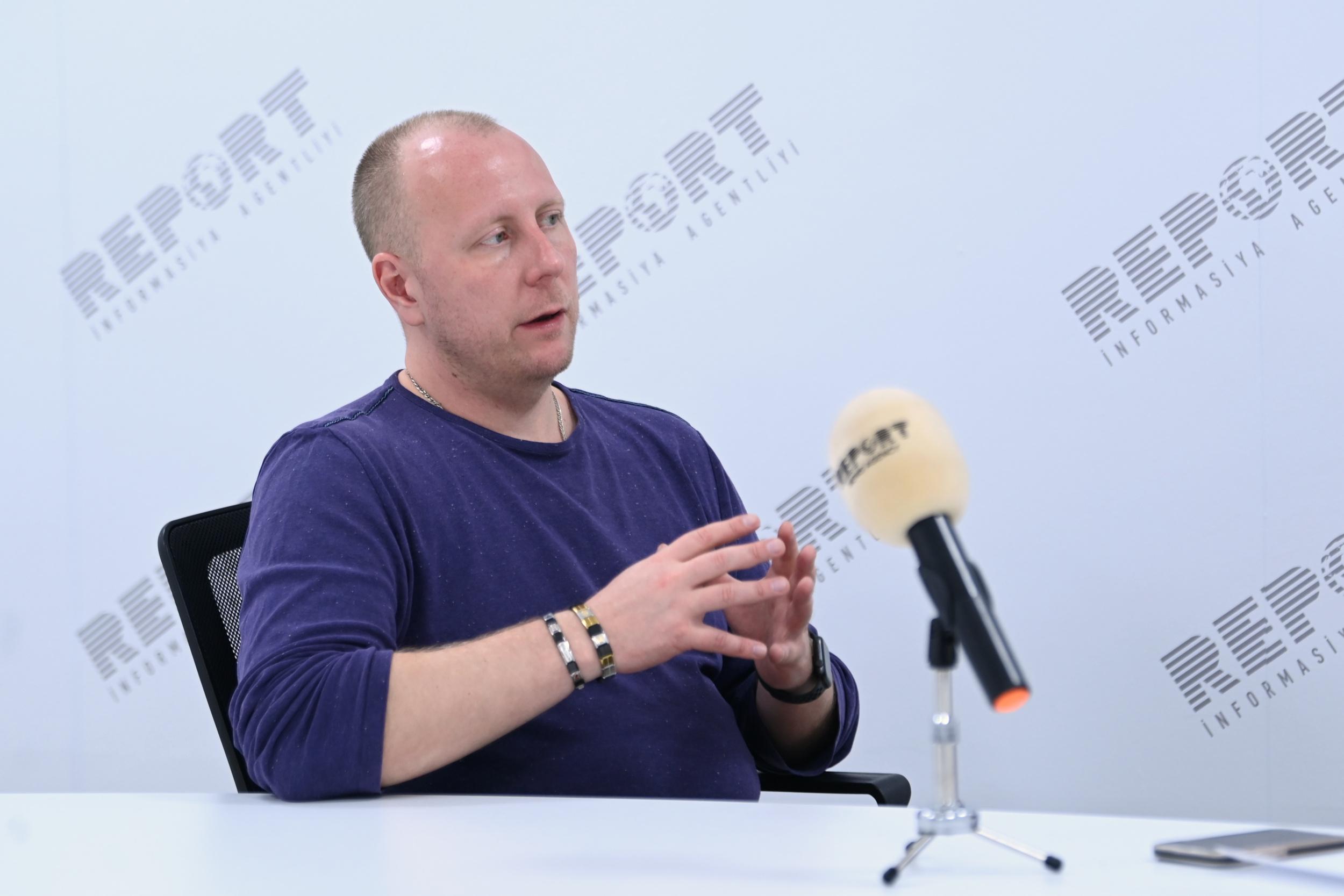
In the first weeks of Russia’s full-scale invasion of Ukraine, some of the staff moved. Someone to the west of Ukraine, someone to another country. Our female employees left for Poland, Germany, Georgia, Turkiye and even Iran. When it became clear that Russian troops would not be able to invade Kyiv, colleagues began to return.
Several male employees went into the army, some went to fight directly, there are those who went to work as doctors, but sometimes they send photos or articles. Thus, we lost some of the staff, their burden was distributed to the rest.
On the other hand, you know that Russia is inflicting massive strikes on the energy infrastructure, and now we have problems with electricity. When the power supply is interrupted, the Internet and mobile communications are lost. That is, the editorial desk drops out of the workflow.
We began to plan the work so that the shift included employees from different cities or from different districts of the same city. Then there is a chance that if someone has no connection, others can continue to work.
The first month of the war, when there was the most intensive shelling of Kyiv, in non-stop mode, was the most difficult. At that time, some of our employees worked from the subway and stayed there overnight due to air raid alerts. The metro is a good bomb shelter, and besides, we have good free internet at all stations. Some with elderly sick relatives moved there with air mattresses so as not to run home and back several times a day. Especially those who live in an area where the shooting is frequent, because there is a military unit or a military enterprise.
In April-May 2022, the situation improved, the frequency of shelling decreased, Russian troops left the Kyiv region, they were forced out by the Armed Forces of Ukraine. After that, life became easier.
- How to deal with disinformation, especially during the war? Who do you think wins the information war? Have you developed methods of how to resist the propaganda of the opposite side?
- Who wins the information war between Russia and Ukraine - it's up to you to tell, things are always more obvious to those on the sidelines. The fight against disinformation has become one of the most important tasks of the Ukrainian media and the public sector since 2014. The events that took place on February 24 came as no surprise to us, because Russia precedes and accompanies all its wars with massive information campaigns.
The same thing happened in Azerbaijan during the events in Karabakh in 1988, back in Soviet times. Then to Transnistria, where the Russian propaganda machine concocted fake stories about Moldovan Nazis allegedly killing Russian-speaking residents of the region. We saw this further in Georgia in 2008, when almost the whole world thought that Georgia had indeed attacked its citizens in Ossetia. And in 2014, they did the same thing - they carried out a massive propaganda campaign for their audience in Crimea, stimulating the Russian population of the peninsula to take some kind of action.
Russia told the whole world that it allegedly had no choice, it was forced to take aggressive actions in order to defend itself. Since then, several communities have appeared in Ukraine, such as Stop fake. This organization is engaged in the refutation of fakes spread by Russian propaganda. Since 2014, one thing has become clear to us: in fact, Russians cannot be trusted, no matter what their official bodies or the media report.
If Russian officials open their mouths, they are lying. For us, this is like an axiom, and when we see this kind of information, we do not specifically study it, we just read it to understand the narrative.
To obtain reliable information, we have our own official bodies, military personnel, exactly those with whom we have contact. They can report what is happening in a particular area. There is an opportunity for our war correspondents to get as close as possible, as far as it is safe, to the scene and transmit information.
We trust Western sources, such as the Report News Agency. It is especially necessary to note the role of your agency’s correspondent in Ukraine, Mubariz Aslanov, who works very hard and travels to hot spots more than some local journalists.
The Russian propaganda machine broke down here: we live in the 21st century and there is the Internet everywhere. There are social networks like Telegram, Facebook, YouTube, Twitter. It is always possible to publish a real picture through photos and videos. Any information can be quickly and easily checked.
We believe in photos, in videos, we believe in volunteers, whom we ourselves know well, who help citizens with evacuation at the front. Russia conducts such ‘psychological’ operations, registering massively fake profiles under Ukrainian names and last names on Facebook, trying to write some provocative messages on their behalf. Often, they are let down by the fact that they do not know the Ukrainian language, they use Google translator, and sometimes this is very noticeable, because the result is funny word combinations and phrases.
The Ukrainian society, media, Western and Azerbaijani media that cover the conflict in Ukraine already have immunity to Russian propaganda. The only ones who still periodically turn to me for clarifications about the reliability of the information are journalists from France. The French are relatively loyal to the sources of information from Russia, the rest of the world does not trust Russia.
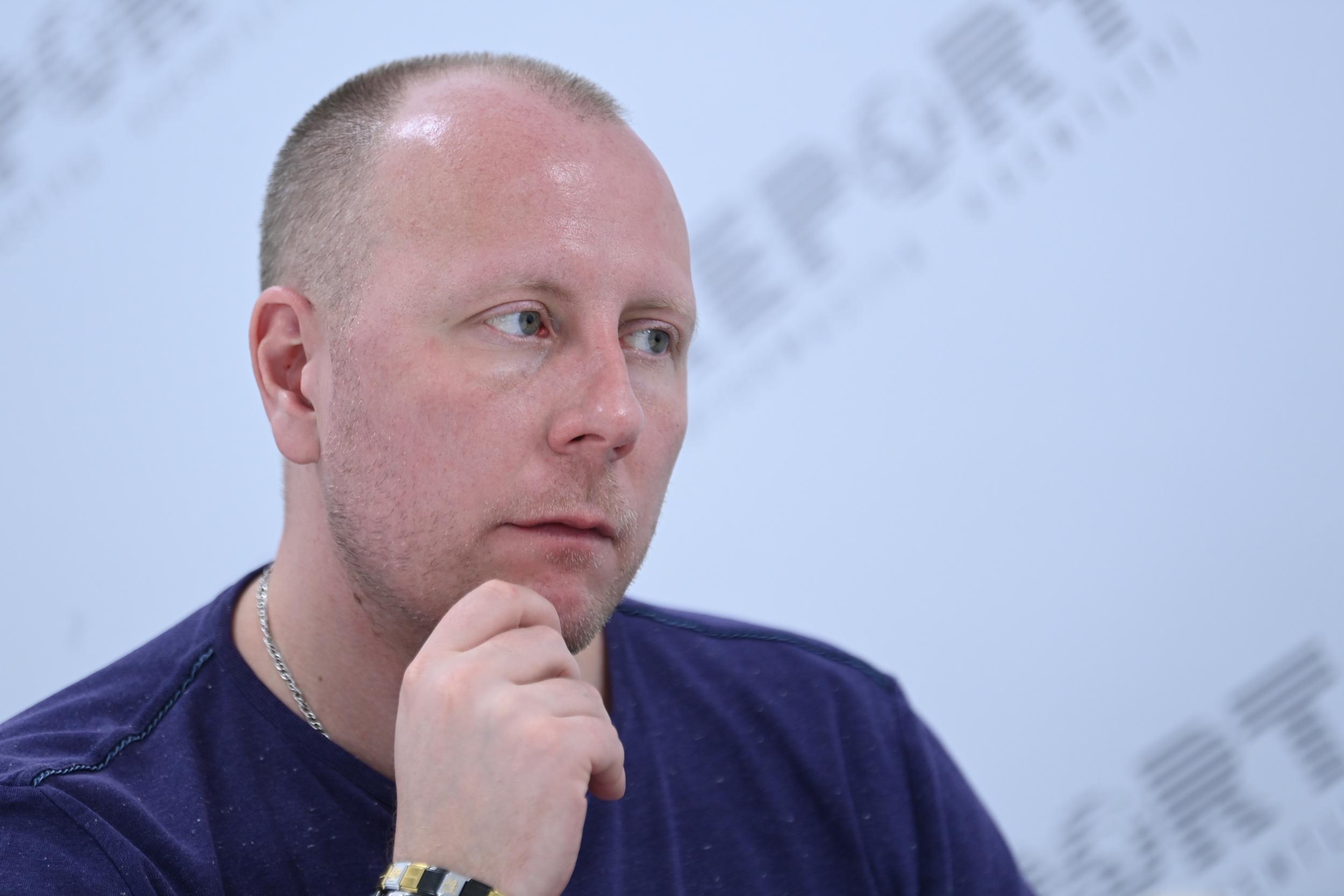
- What are the difficulties in managing news agencies and how to overcome them? How do you assess the role of the media, in particular UNIAN, in uniting the Ukrainian people?
- UNIAN is not difficult to manage, because we have a very professional team, a good team that has been working together for many years. We understand our responsibility, and our journalists provide each other with the necessary support, and everyone knows what they need to do in their area.
I experience the pleasure of working with our team, just how I did before the war. We don’t have such situations when someone breaks promises, or doesn’t do what is necessary.
I have been in charge of UNIAN since 2012 and I consider formation of the right team the key factor in facilitating work. Firstly, this is a team of editors, and secondly, correspondents who have common values and are patriots of their country.
I consider myself lucky to work in a company that is part of the country’s leading media holding "1+1". In addition, we also have a "1+1" channel, which, after the full-scale invasion of Russia, mainly broadcasts news 24/7.
There is also UNIAN TV, which, as we expect, will become a full-fledged channel after the end of the war. Now its team is working on a Russian-language telethon of Ukrainian TV channels aimed at the appropriate audience - this permanent news broadcast is released under the Freedom brand. The main task is to provide people with truthful information. When people are informed, they understand what is happening, it calms them down and there is no panic.
In addition, the information allows people to decide to stay in a particular city or better to evacuate.
I believe that the media is a bridge between the population and the authorities with the military. The honesty and reliability of the information we provide is very important here. When there is trust between society and government, there is both patriotism and motivation to defend one’s country. I believe that such a country cannot be defeated, and we believe in it.
I want to note that some channels did not broadcast a round-the-clock informational marathon, but instead began to support people in a different way: they showed good films around the clock, about the struggle between good and evil, like ‘Harry Potter.’ This helped calm the children and gave people hope. Even in the spring, when the Russian troops were advancing in tanks, we still hoped that we could win. When people believed this, there was a collective feeling that Russia had already lost and would not be able to achieve any of its goals.
- Do you develop cooperation with foreign media? How do you rate this in general?
- UNIAN cooperates with international media, at different times we signed relevant memorandums and exchanged news with such agencies as Thomson Reuters, Bloomberg. Also, we sold our news to various media, diplomatic services around the world. Our photo service is probably the most popular in Ukraine, photo and video materials are purchased by all the largest newspapers in Europe and the US, including Netflix. We have three full-time photographers in Kyiv, and several more freelancers for each region of Ukraine. In general, more than 30 photojournalists cooperate with us. After February 24, 2022, the demand for such content increased.
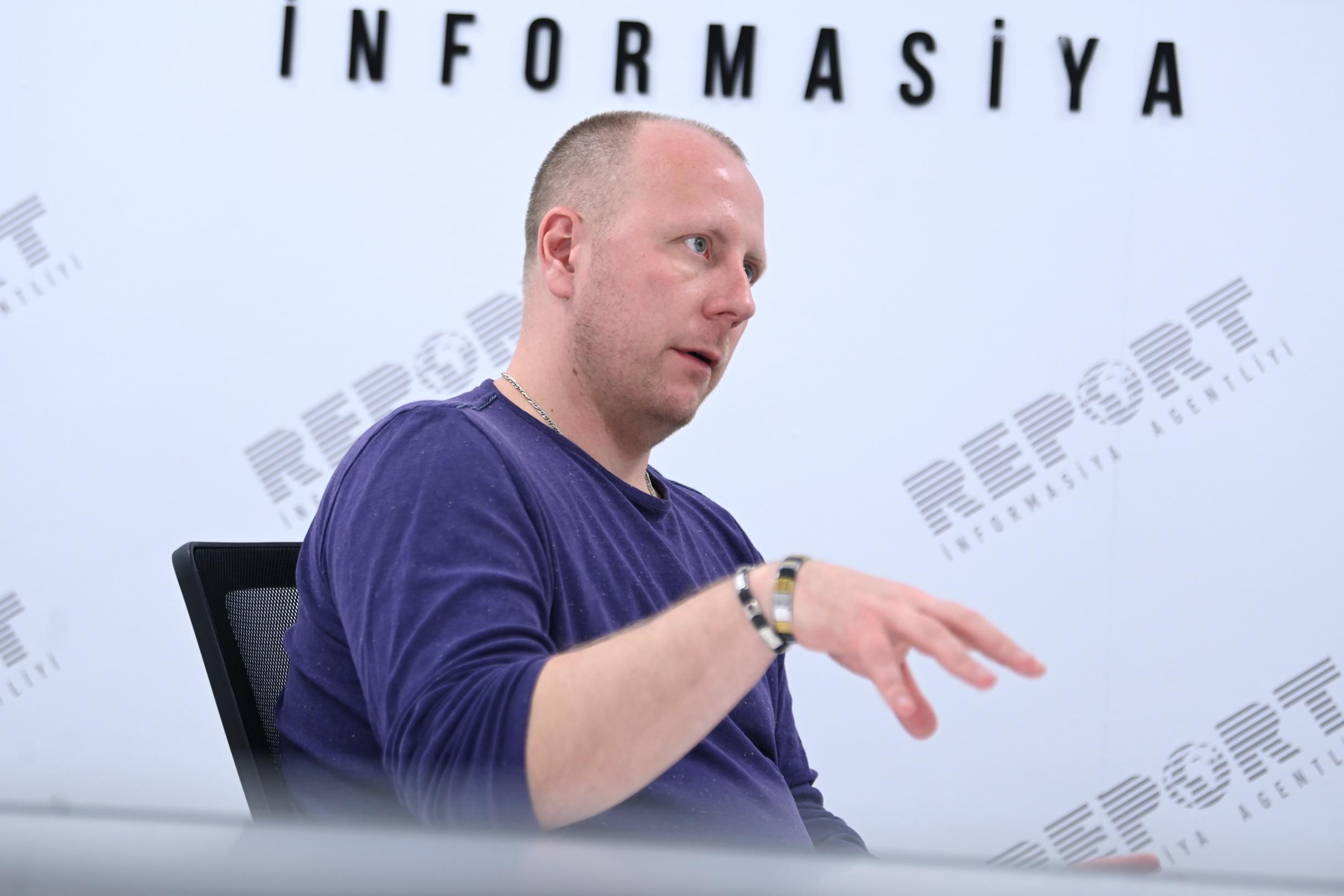
I want to note that in order to bring the truth to the whole world, we provided free access to download our photos and videos for a while. There is still free access to the materials on our telegram channel.
- How do you assess the activities of the media in Azerbaijan? What experience should be adopted from Ukrainian colleagues? How can our experience be useful for you?
- I don’t know much about media activities in Azerbaijan. We read Report, we read your articles during the liberation war in Karabakh two years ago. We realized that the Armenian side uses the same methods as the Russian side, spreading fakes, distorting information and facts, playing on emotions.
Two years ago, we signed a cooperation agreement with your agency, which involves the mutual use of news about our countries. This is very important, because for Russia the distortion of facts is already the norm, Russian propaganda spends huge resources on imposing its point of view. The Russian language is widely spoken, many people know it, and this gives Russia the opportunity to have an impact. We saw that during the Karabakh war, Russia completely took the side of Armenia. Unfortunately, some Ukrainian media at first, due to misunderstanding, sometimes took news from Russian sources.
Our cooperation means that we have one source of information about events in Azerbaijan, which we trust. Perhaps sometimes we can also take information from the world’s reputable media, such as The New York Times, Associated Press, Reuters - when they report something first. But judging by the way you covered the Karabakh war, you did a pretty good job, Report also works well in covering the war in Ukraine.
- You mentioned that you signed a cooperation agreement with our agency. How do you rate this cooperation? What can be improved in the future?
- We are very pleased with the signing of this memorandum, thus Report uses us as a source and does not follow Russian propaganda. When we write news related to Azerbaijan, of course, Report is used as a source.
I really want peace to come to our countries. I really want Ukraine to win this war, so that we can restore our territorial integrity within the borders internationally recognized in 1991. I want you and me to meet at some experience exchange seminar in Crimea, to be able to go to Mariupol.

When peace comes to our lands, when we get bored again that there is no news, then we will gather somewhere, for example, in Karabakh and think of what to write about. Maybe we will do joint projects that will not be related to the war? Maybe exchange students or journalists. This is my greatest wish.
I hope that after the victory of Ukraine we will be able to open our representative office in Baku and appoint our correspondent here. I hope that during the period of post-war reconstruction of Ukraine, Azerbaijan will also participate in this as a partner.
It will be possible to expand the presence of Report in Ukraine. I want Azerbaijanis to learn more about Ukraine, and Ukrainians to learn more about Azerbaijan.
I am here for the first time, admiring the beauty of Baku, this is a very attractive tourist destination for Ukrainians. There is a beautiful embankment, architecture and a lot of greenery, many cafes, restaurants, delicious food and wine. This is all that Ukrainians like a lot.
Our agency has a section on tourism, which is quite popular. But many do not have enough information about Azerbaijan, and my task after the end of the war, when I have the opportunity to travel, is to tell more about your country.
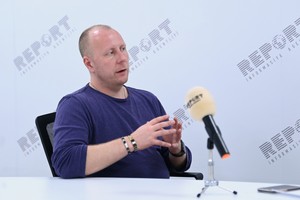
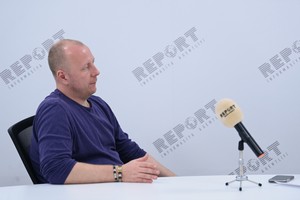
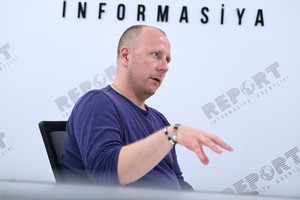
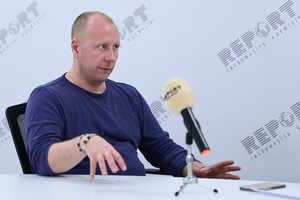

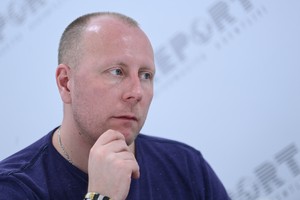
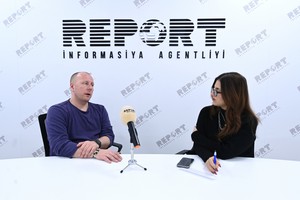


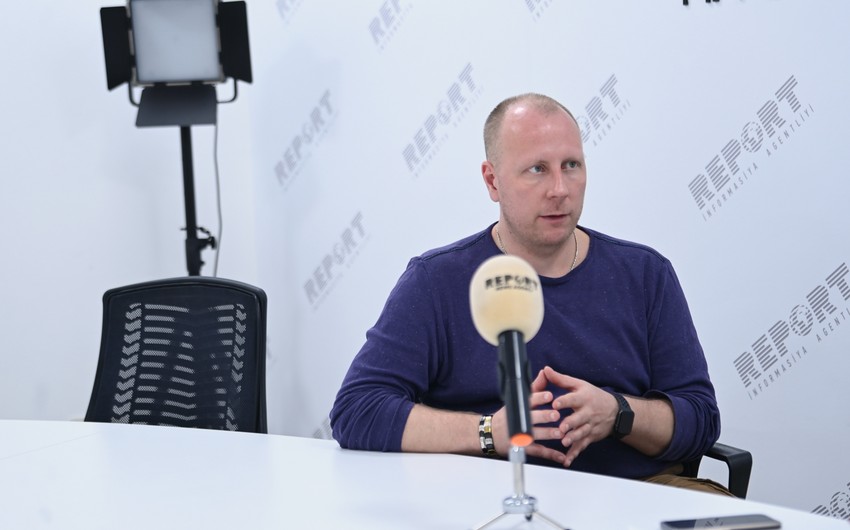 https://static.report.az/photo/4a48d58f-c34a-3ad5-9ba7-349e197cb19e.jpg
https://static.report.az/photo/4a48d58f-c34a-3ad5-9ba7-349e197cb19e.jpg

